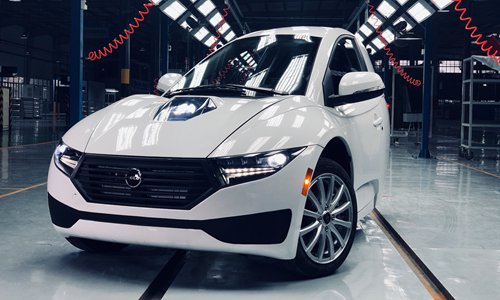
A SOLO EV produced by Electra Meccanica Vehicles Corp Photo: Courtesy of Electra Meccanica. (Photo: GT)
New Canadian entrants to the Chinese market are facing the toughest time as the case of Huawei's Chief Financial Officer (CFO) Meng Wanzhou continues to ferment, despite the fact that some Canadian companies have shown their eagerness in recent weeks to enter China, Chinese experts said on Monday.
Vancouver-based electric-vehicle manufacturer Electra Meccanica Vehicles Corp opened the Zongshen SOLO EV production facility, its first in China, in Southwest China's Chongqing Municipality on February 25, according to recent media reports. The single-passenger, highway-ready SOLO retails for $15,500 and can travel around 161 kilometers on a six-hour charge.
"Electra Meccanica will continue to mass-produce SOLOs and other cars in China, and I anticipate we will also begin retail operations in the near future," Jerry Kroll, CEO of Electra Meccanica, was quoted as saying in a note the company sent to the Global Times on Saturday. "It is a large market, and our futuristic and cost-effective SOLO appeals to a great percentage of the clean energy automobile market and will compete well with other manufacturers," Kroll said.
However, Feng Shiming, a car analyst at Shanghai-based Menutor Consulting, showed concern over the company's expansion in the domestic market as "the product does not meet Chinese consumers' aesthetic standards."
It looks like "a car whose rear end was cut off in an accident," Feng told the Global Times on Monday.
The Canadian carmaker will face intense competition and have an "uneasy time" in the Chinese market since its retail price is not attractive and the domestic market offers more choices, he said.
"Why would a consumer buy a three-wheeler when for a similar price, he can purchase a four-wheel vehicle that has a longer battery life?"
Feng suggested that foreign vehicle companies should conduct comprehensive research about the Chinese market before making any investment.
Another concern is that as Canada has insisted on the extradition of Meng, domestic sentiment toward Canadian products will continue to intensify, experts said. But Canadian companies are reluctant to leave the Chinese market, they noted.
Canada's Department of Justice issued an Authority to Proceed on Friday, formally commencing the extradition process of Meng, who was arrested in Vancouver at the request of the US on December 1, 2018.
Wang Danqing, a partner with Beijing-based ACME consultancy, told the Global Times on Monday that Canadian companies cannot lose the Chinese market, which features great consumption potential, although they will face the toughest time in China.
However, Wang said that the conflicts are temporary and cooperation is a long-term goal, as China is determined to open up and welcome foreign investment.
On February 26, Canadian coffee chain Tim Hortons opened its first store in the Chinese mainland in Shanghai.
"Honestly speaking, I don't want a car from the Canadian firm at this time because Canada's move to extradite Meng made me dislike products related to the country," a Beijing-based white-collar worker named Chen Guo told the Global Times on Monday.
"Many Chinese carmakers have already produced electric vehicles with better functions. I would rather support China-made goods," he said.
"If Canada cannot wake up and still insists on the US request to deal with Meng's case, Canadian products will lose more and more Chinese consumers in the future," Chen noted.


